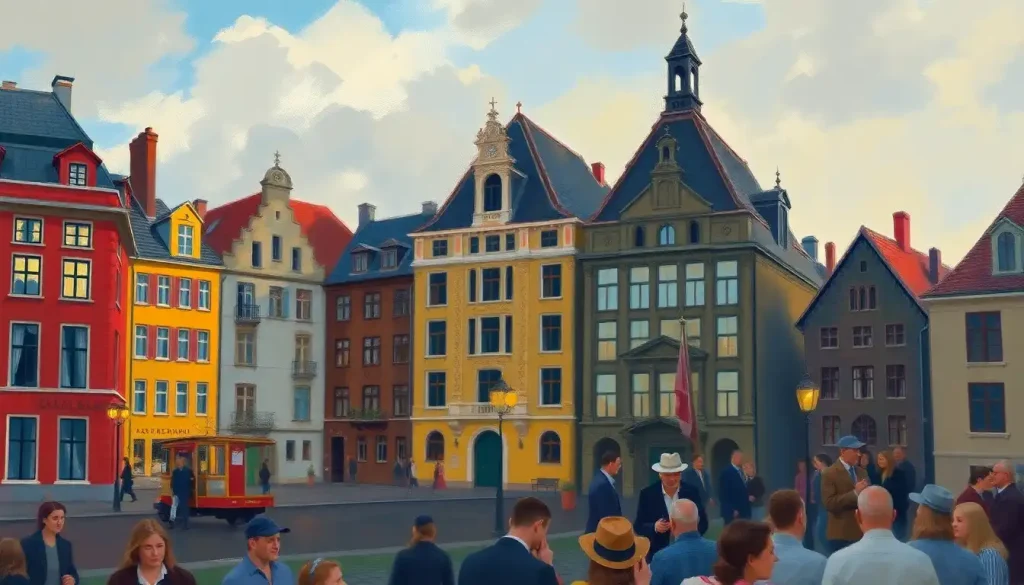Picture yourself as a budding artist, armed with talent and vision, but yearning for the business acumen to turn your passion into a thriving enterprise—this is where creative entrepreneur accelerator programs step in to bridge the gap. These innovative initiatives are designed to nurture the entrepreneurial spirit within artists and creatives, providing them with the tools, knowledge, and connections necessary to transform their artistic endeavors into successful businesses.
In recent years, the creative industry has witnessed a surge in the popularity and importance of accelerator programs. These intensive, time-bound courses are tailored specifically to the unique needs of creative entrepreneurs, offering a blend of mentorship, education, and networking opportunities that can catapult a fledgling artistic venture into a thriving enterprise. But what exactly are these programs, and why have they become such a game-changer for artists with entrepreneurial ambitions?
Unleashing Creativity in the Business World
At their core, creative entrepreneur accelerator programs are intensive boot camps for artists who want to make a living from their passion. They’re not just about honing your craft—though that’s certainly part of it. These programs are about teaching you the nitty-gritty of running a business, from financial planning to marketing strategies, all while keeping your artistic vision intact.
Imagine spending a few months surrounded by like-minded creatives, all buzzing with ideas and ambition. You’re learning from industry veterans who’ve been there, done that, and are now passing on their hard-earned wisdom. It’s like being handed a roadmap to success, complete with shortcuts and insider tips.
But why the growing buzz around these programs? Well, in today’s digital age, the lines between art and commerce are blurring faster than ever. Artists are no longer content to starve in garrets, waiting for their big break. They’re taking control of their careers, and these accelerator programs are giving them the tools to do just that.
The Secret Sauce: Key Ingredients of Success
So, what’s in the special sauce that makes these programs so effective? Let’s break it down:
1. Mentorship: Picture having a personal guru, someone who’s walked the path you’re on and can guide you through the twists and turns. That’s what mentorship in these programs offers. It’s like having a backstage pass to success.
2. Business Boot Camp: Ever tried to decipher a balance sheet and felt like you were reading hieroglyphics? These programs translate the language of business into terms that resonate with creative minds. You’ll learn about things like pricing your work, managing cash flow, and scaling your business—all crucial skills for any art entrepreneur.
3. Networking Nirvana: Remember that saying, “It’s not what you know, it’s who you know”? Well, in the creative world, it’s both. These programs connect you with a tribe of fellow creatives, potential collaborators, and even investors who might just fall in love with your vision.
4. Resource Goldmine: From state-of-the-art equipment to legal advice, these programs often provide access to resources that would be out of reach for most starting artists. It’s like being given the keys to a creative kingdom.
Who’s It For? The Creative Kaleidoscope
Now, you might be wondering, “Is this for me?” Well, if you’re a creative with entrepreneurial itch, chances are there’s a program out there with your name on it. Let’s paint a picture of who these programs cater to:
Visual Arts and Design: If you’re a painter, sculptor, graphic designer, or any other visual artist looking to turn your creations into a viable business, these programs can help you frame your future.
Performing Arts: Actors, musicians, dancers—your talent deserves an audience and a paycheck. These programs can teach you how to market yourself and manage the business side of show business.
Digital Media and Content Creation: In today’s digital world, content is king. If you’re a YouTuber, podcaster, or digital artist, these programs can help you navigate the ever-changing landscape of online media.
Craft and Artisanal Products: Handmade doesn’t mean small-time. If you’re creating unique, artisanal products, these programs can help you scale your business without losing that personal touch.
Getting Your Foot in the Door: The Application Process
Alright, so you’re sold on the idea. But how do you get in? The application process for these programs can be as competitive as a gallery opening on a First Friday. Here’s how to make sure your application doesn’t end up in the rejection pile:
First things first, check the eligibility criteria. Most programs have specific requirements, whether it’s the stage of your business, your age, or your location. Don’t waste time applying if you don’t fit the bill.
Next up, prepare a killer application. This is your chance to shine, to show why your creative business deserves a spot in the program. Be authentic, be passionate, but also be professional. Remember, they’re looking for artists who can think like entrepreneurs.
One common pitfall? Focusing too much on your art and not enough on your business potential. Yes, your creativity is important, but these programs want to see that you’re serious about turning that creativity into a sustainable business.
Want to stand out? Show that you’ve done your homework. Research the program, understand its values and goals, and demonstrate how you align with them. It’s like tailoring your portfolio for a specific gallery—you want to show why you’re a perfect fit.
Success Stories: When Dreams Take Flight
Now, let’s talk inspiration. The world of arts entrepreneurship is filled with success stories of creatives who took the leap and soared. Take Sarah, for example. She entered an accelerator program with a small Etsy shop selling hand-painted postcards. Two years later, her designs are featured in major retail chains across the country.
Or consider Marcus, a street performer who used the skills he learned in an accelerator to turn his one-man show into a touring production company, employing dozens of other performers.
These aren’t just isolated incidents. Studies have shown that businesses that go through accelerator programs are more likely to secure funding, achieve sustainable growth, and survive the crucial early years. It’s like giving your creative business a turbo boost.
But the benefits go beyond just immediate success. Many alumni report that the networks they built during their time in these programs continue to provide value years down the line. It’s like joining an exclusive club of creative movers and shakers.
Navigating the Challenges: Balancing Art and Commerce
Now, let’s get real for a moment. These programs aren’t all rainbows and unicorns. They come with their own set of challenges. One of the biggest? Learning to balance your artistic integrity with business demands.
It’s a common fear among artists—that focusing on the business side will somehow dilute their creativity. But here’s the thing: understanding the business doesn’t mean compromising your art. It means finding ways to make your art sustainable.
The pace can be intense, too. These programs often cram years’ worth of business education into a few months. It’s like trying to drink from a firehose of information. But remember, growth often happens outside your comfort zone.
Another challenge? Dealing with feedback and criticism. In these programs, you’ll be constantly pitching your ideas and getting feedback. It can be tough, especially if you’re used to working solo. But learning to take constructive criticism and use it to improve your business is a crucial skill for any entrepreneur.
Maximizing Your Accelerator Experience
So, how do you make the most of these programs? Here are a few tips from accelerator alumni:
1. Be a sponge: Absorb everything you can. Even if something doesn’t seem immediately relevant, file it away. You never know when it might come in handy.
2. Network, network, network: The connections you make can be just as valuable as the skills you learn. Don’t be shy—reach out, make friends, build relationships.
3. Take risks: Use this time to experiment. Try new things, test out ideas. It’s a safe environment to push your boundaries.
4. Stay true to your vision: While it’s important to be open to feedback, don’t lose sight of what makes your creative business unique. Your passion and vision are your greatest assets.
5. Follow through: The program is just the beginning. The real work starts when you leave. Make sure you have a plan to implement what you’ve learned.
The Future of Creative Entrepreneurship
As we look to the future, it’s clear that creative entrepreneur accelerator programs are here to stay. In fact, they’re evolving to meet the changing needs of the creative industry. We’re seeing more specialized programs popping up, focusing on niche areas like sustainable fashion, virtual reality art, or social impact creativity.
There’s also a growing trend towards virtual and hybrid programs, making these opportunities more accessible to creatives around the world. Imagine joining a cohort of international artists, all bringing their unique cultural perspectives to the table. The potential for cross-pollination of ideas is exciting, to say the least.
Your Creative Business Awaits
So, there you have it—a deep dive into the world of creative entrepreneur accelerator programs. These initiatives are more than just business courses; they’re launchpads for artistic dreams. They provide the missing link between creative talent and business success, helping artists navigate the often-murky waters of entrepreneurship.
If you’re a creative with big dreams and a hunger for success, consider this your call to action. Entrepreneur programs like these could be the catalyst that transforms your passion into a thriving business. After all, in today’s world, there’s no reason why “starving” and “artist” should go hand in hand.
Remember, every successful creative business started with a leap of faith. Maybe it’s time for you to take yours. Who knows? The next success story we talk about could be yours. So go ahead, embrace your inner entrepreneur accelerator, and let your creativity soar—not just on canvas or stage, but in the business world too.
The world is waiting for your unique vision. Are you ready to share it?
References:
1. Essig, L. (2017). “Same or Different? The “Cultural Entrepreneurship” and “Arts Entrepreneurship” Constructs in European and US Higher Education”. Cultural Trends, 26(2), 125-137.
2. Beckman, G. D. (2007). “‘Adventuring’ Arts Entrepreneurship Curricula in Higher Education: An Examination of Present Efforts, Obstacles, and Best Practices”. The Journal of Arts Management, Law, and Society, 37(2), 87-112.
3. Bonin-Rodriguez, P. (2012). “What’s in a Name? Typifying Artist Entrepreneurship in Community Based Training”. Artivate: A Journal of Entrepreneurship in the Arts, 1(1), 9-24.
4. Thom, M. (2017). “Arts Entrepreneurship Education in the UK and Germany: An Empirical Survey among Lecturers in Fine Art”. Education + Training, 59(4), 406-426.
5. Chang, W. J., & Wyszomirski, M. (2015). “What is Arts Entrepreneurship? Tracking the Development of its Definition in Scholarly Journals”. Artivate: A Journal of Entrepreneurship in the Arts, 4(2), 11-31.
6. Naudin, A. (2018). “Cultural Entrepreneurship: The Cultural Worker’s Experience of Entrepreneurship”. Routledge.
7. Nytch, J. (2012). “The Case of the Pittsburgh New Music Ensemble: An Illustration of Entrepreneurial Theory in an Artistic Setting”. Artivate: A Journal of Entrepreneurship in the Arts, 1(1), 25-34.
8. White, J. C. (2013). “Barriers to Recognizing Arts Entrepreneurship Education as Essential to Professional Arts Training”. Artivate: A Journal of Entrepreneurship in the Arts, 2(3), 28-39.
9. Essig, L., & Guevara, J. (2016). “A Landscape of Arts Entrepreneurship in US Higher Education”. Pave Program in Arts Entrepreneurship, Arizona State University. https://herbergerinstitute.asu.edu/sites/default/files/a_landscape_of_arts_entrepreneurship_in_us_higher_education_0.pdf
10. Gangi, J. J. (2017). “Towards Consensus: Suggested Foundational Building Blocks for Arts Entrepreneurship Research and Pedagogy”. Artivate: A Journal of Entrepreneurship in the Arts, 6(1), 46-62.












Would you like to add any comments? (optional)